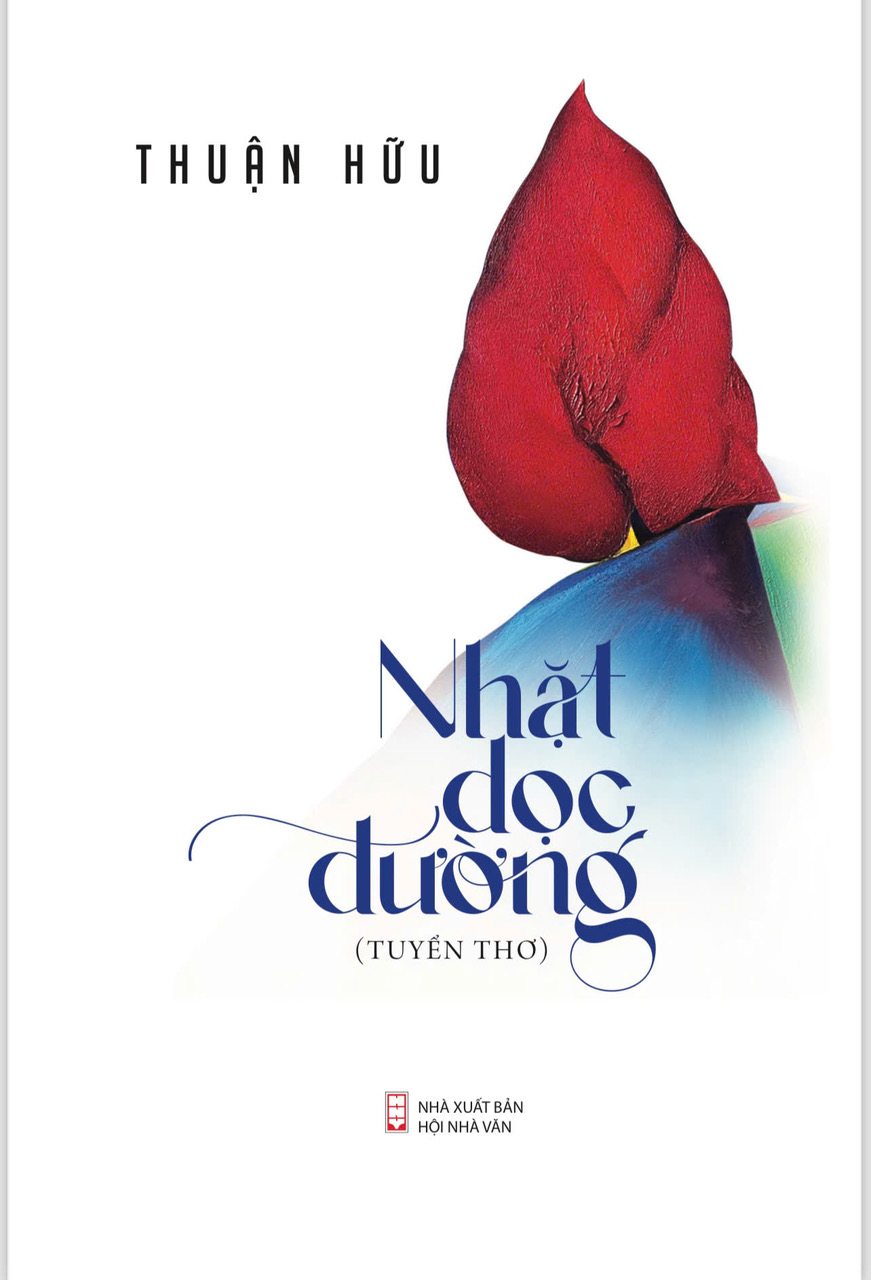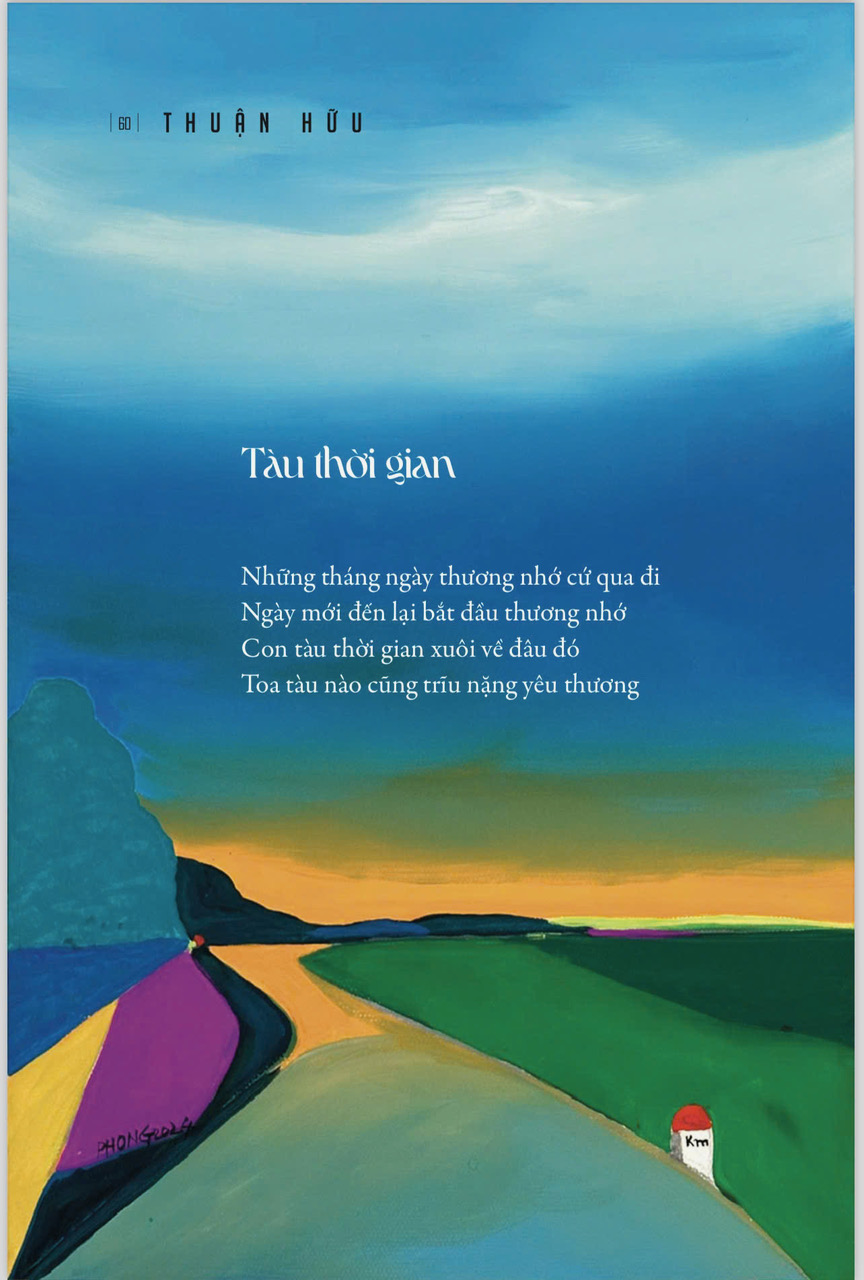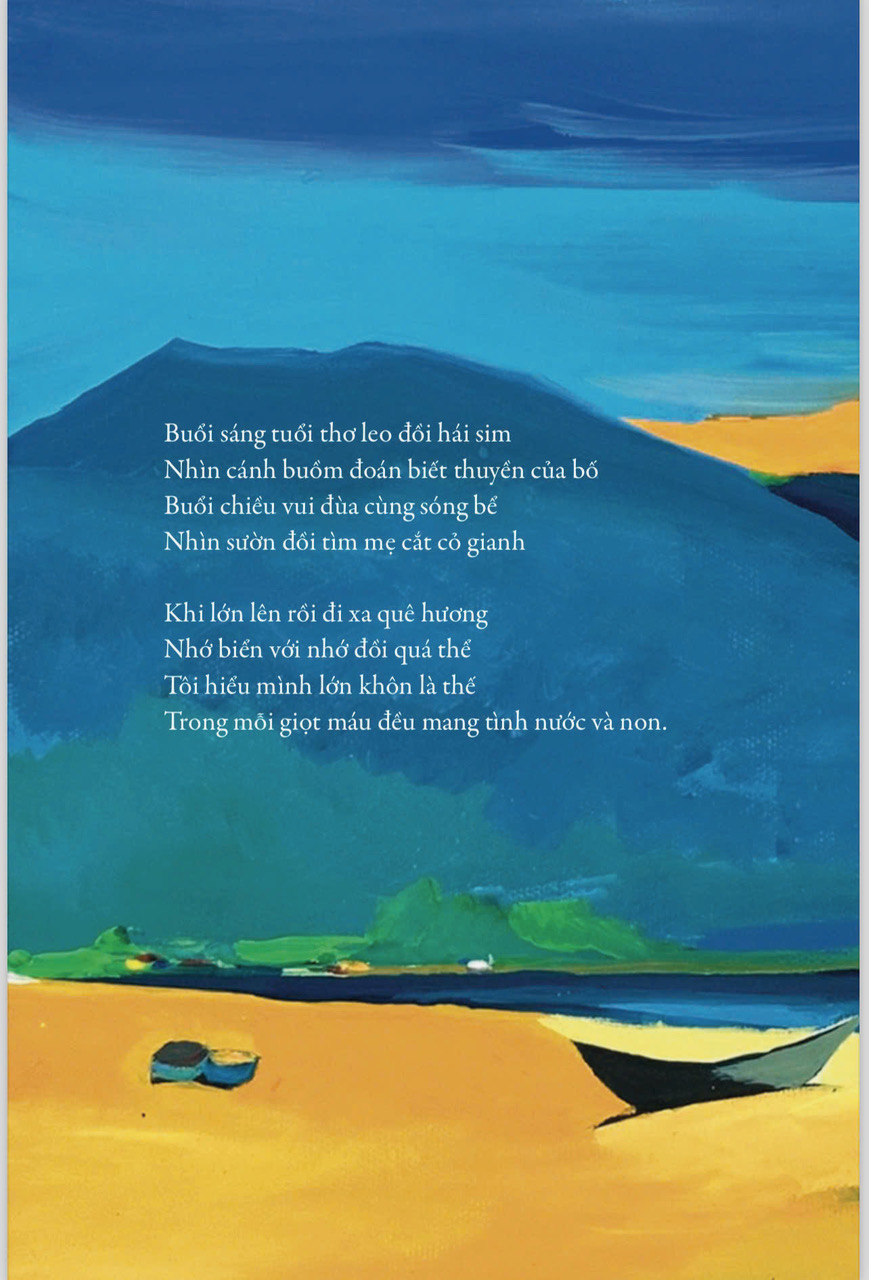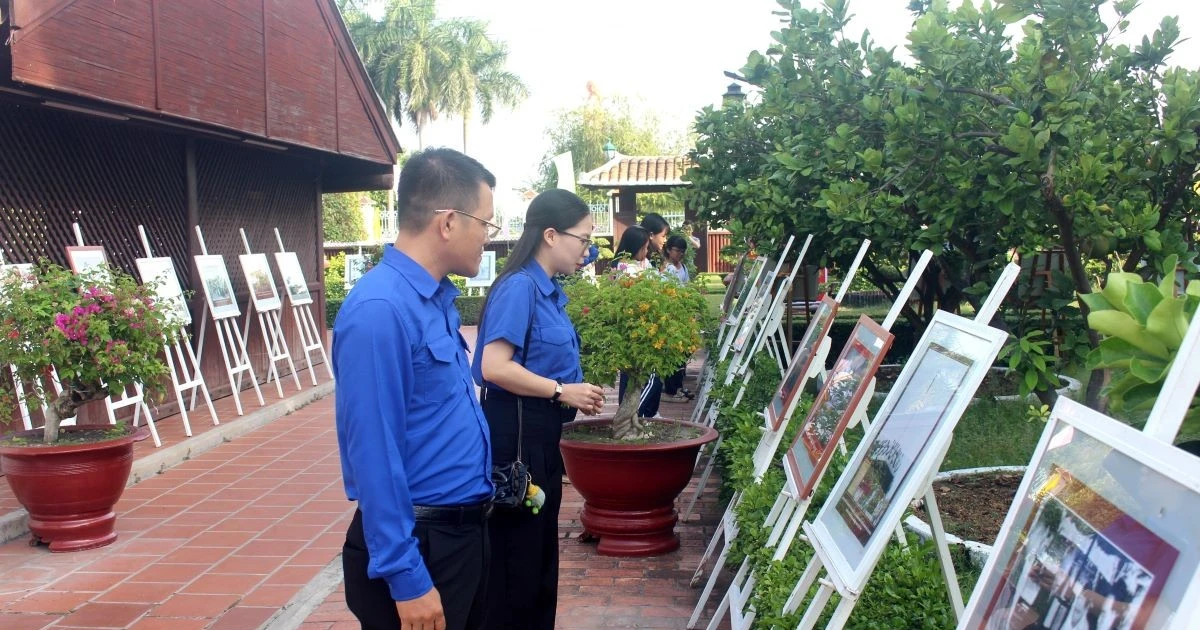He always considered poetry a sacred realm that he was not yet qualified or ready to enter. But in fact, he was already a person in that realm. And from him, poetry emerged in a different way - the path of his own life. At this moment, I remember a saying of someone: " No one hears the noise of flowers before they burst from the branches ". Thuan Huu lived like that and his poems were born like that: natural and simple.
Reading his poems, I always see the image of a person walking on hot sand, walking in the rain and wind, walking in all the joys and sorrows of life. While walking, that person speaks about his path, about the world he lives in, and the voice of that person is the verses and it was born simply like that.
My village
Back to the mountains
Eyes looking straight out to sea
I am a child of a hill country
But also a child of the sea
Love of country is in the blood and flesh
I grew up in the sun, wind, mountains and ocean waves.
I read this stanza many times. There is nothing elaborate, nothing unusual, no "rhetorical technique", nothing strange to me and to many people. Everything is simple. And I realized: it is the manifesto of a person. That person was born and raised on that land and both confirmed his homeland and declared his origin and his reason for living: " Love for the country is in the blood and flesh/I grew up in the sun, wind, mountains and hills and the waves of the ocean". The verse "I grew up in the sun, wind, mountains and hills and the waves of the ocean" is beautiful, touching, full of challenges and also full of pride. Thuan Huu does not consciously write poetry like a poet. The number of poems he wrote is sometimes even more than mine. But unlike me, he wrote quietly as his own confession in the dark moments of time.
With what he wrote, appearing on the page, I see his soul as a bell. That bell moves in life, touches what is in life (both joy and sadness) and rings by itself. This is the most important and vital thing in his poetry. I choose the image of the bell and its ringing sound to talk about the nature of Thuan Huu's poetry. Because when he writes about sadness, about pain, about uncertainty, about darkness and anything, in the end, beauty, love for humanity, the light of hope and human pride still overcome everything to ring.
More than twenty years of bitter and sweet
I am like the Han River hiding everything in my heart
Amidst the dark and gloomy life, the river still flows
Da Nang is still filled with the scent of the first kiss.
Poetry is who he is. He can hide his sadness and torment from his colleagues, friends and relatives. But he cannot hide who he is in the echoes of poetry.
He was silent when he saw the wild flower branch.
In the middle of barrenness, there is still purple to the point of tears...
Every land he passed through resonated in his soul with joy and sadness. Poems were born from those lands. That was love, experience, contemplation, discovery of people, of the meaning of life and from there beautiful dreams were awakened:
Late nights listening to the train whistle
The desire rushed back and suffocated him.
When will you set sail like that ship?
Where do the waves beat in the vast ocean?
There is nothing simpler than verses like that. It is as if he woke up before the sea and spoke as if only for the sea to hear. Those verses prove that he did not use any techniques or rhetoric to write poetry. He let life sow into his human soil and sprout, grow, blossom and bear fruit in his spiritual life. “When will you set sail like that ship/Where will the waves beat on the vast ocean?” Resonant, emotional and filled with aspiration. Something both majestic, proud and resounding forever from those two verses. When I read those two verses, I woke up in the night, I wanted to leave like that ship, I wanted to overcome the ocean waves of this life, I wanted to sing loudly in the face of all challenges…
One has friends and one has God.
I am alone
Alone without God, without company
Being a stranger in this world...
Without reading such verses, I could not have truly understood the man named Thuan Huu. Most of his poems were written when he was in a position where people often hide their honest feelings, thoughts and views. His will may have told him to hide himself, but his soul had already flapped its wings to fly to freedom. I heard the flapping of his soul. Poetry is the most reliable record of the soul, the state of mind of the person who wrote it.
In this vast world, with so much noise and not a little halo surrounding him, he still realized the loneliness of a wanderer in his silent world. That is his "human quality" and also his "poetic quality". That is what makes readers or at least me personally trust his poems. And that is what makes his poems "powerful", the power of truth and simplicity.
Winter is over
Trees on branches change leaves
Bird from a strange land
Fly back to the familiar garden
I want to immerse myself in that garden on a winter day. Only by truly immersing myself in that space and time can I see the vastness of the verses, what is rising and resonating in the poet's soul, or more fully, what is rising and resonating in this life. We do not find any difference, any abnormality or any "emotional exaggeration" in those verses. We only see the miracle of nature offered in the understanding, listening and feeling of the poet's subtlety and depth. In that scene, I wanted to cry. I have received God's blessing, I have lived, I have healed the brokenness somewhere in me, I have recognized my lost steps on the paths of life, I have found again what I have forgotten, what I have lost. The strange birds flying back to the familiar garden make me relive many things. Immerse yourself in a garden on a winter day to listen to the flapping of the returning birds' wings, you will realize a greatness, though very vague, covering your soul.
Poetry not only brings us new images, new words, but most importantly, it makes us realize new emotions, new perspectives, new meanings from what we feel is lost, has declined or has died. The verses of Thuan Huu that I quoted are such verses. One thing that is both clear and truly great in Thuan Huu's poetry is: He found, felt and cried out like a child before the greatness and alluring power of this life.
The town without you, the town becomes sad
Mom keeps reminding me that the house feels empty.
I followed my husband to a far away place.
Leave your sadness with Tay Son.
Same as always. Thuan Huu still has no "pre-plan" for his sentences, paragraphs and poems like that. He just goes, just lives, just thinks about life in which he is both a person who lives in it and a witness of that life. Reading his poems gives me that thought. I believe that the town could not appear so close, sympathetic and tormented if it were written in verses in a different way. Honesty often puts poetry at risk of disappearing, but honesty can touch the bottom of what we want to say. And that town appeared to me. It appeared to the point that I could see each wind blowing through the houses, see the silhouette of a girl drying her clothes, drying her hair and then disappearing. The above poem reconstructs a space and a time that has disappeared or changed. If we only focus on the "difference" of the images, of the language, of the structure... we will not realize that poetry has revived that town. But if we immerse ourselves in the atmosphere that the poems bring, we will find ourselves living in that real town, not a dream. This is a very special characteristic of Thuan Huu's poetry. More than the characteristic is the spirit in his poetry. More specifically, it is Thuan Huu's person, Thuan Huu's soul.
AROUND THE STORY OF A PINE TREE
Last year here
Love the lonely pine tree on the mountain top
Standing alone listening to the wind blow all year round
This year again here
Looking up at the mountain top
The pine tree is gone.
The old mountain top was eroded by rain into a ditch.
The pine tree died like a fateful word
Cannot stand alone in the face of mountain rain and wind.
I have passed through many bamboo villages.
Through the pine forests hear the sea singing
Through the green pine hills as far as the eye can see
The nature around me always reminds me
Trees and people must rely on each other...
One thing I realized along Thuan Huu's "poetry path" is: the beauty and message of life are always hidden around us. When I was young, I read a saying about poetry by the great American poet Walt Witman: "Poetry is right under your feet. Bend down and pick it up ." I did not understand that saying. I even doubted that saying. I thought poetry must come from another kingdom, another holy land. But then life and poetry made me realize the creative truth from that saying. The bamboo groves, the poplar forests, the pine hills in our country send us profound and great messages every day, but not everyone can read the text of those messages.
Many of Thuan Huu's poems are explorations of nature, explorations of people, and from there, they send us messages of life. Poetry does not come from a strange planet in this endless universe. Poetry comes from everywhere, every place, every human life that we have gone through, lived with. Poetry waits for people with a loving heart, a deep insight, a beautiful aspiration to step forward so that it can give that person inspiration, words and thoughts and turn those simple things into poetry and turn that person into a poet. Thuan Huu is such a case. And I have the right to call him a poet even though he always tries to deny and sometimes run away. Thuan Huu can run away from what is called poetry. But Thuan Huu cannot run away from life, where in every life, even the dark and tragic ones, poetry resides.
The hen's hair is white at the end of the year
Sitting quietly beside the grave of mother green
Just two poetic lines full of images written about mother have spoken to the utmost loneliness of a child without a mother. Talking about loneliness without using any adjectives to describe loneliness. The white color of the hair on the child's head in that space, that time made me see the devastated heart of the child named Thuan Huu. I once wrote about an afternoon like that in front of my mother's grave with words, images, and sorrow full of "complexity and sophistication" but could not touch the truth about my loneliness when I lost my mother. And when reading Thuan Huu's poems about his deceased mother, I felt that at some point I had to rewrite the poems about my mother.
Those two verses push the child's loneliness to the extreme. The mother has merged into the green grass, into the endless land. The white hair on the child's head evokes the desolation, the sadness, the soulless emptiness of the child who has lost his mother. A minimalist way of speaking and full of silence in pain. If we hear the child's miserable crying in front of his mother's grave, we only see sadness and sympathy, but we cannot feel all the pain and loneliness of the child. But with those simple and extremely simple verses, the whole truth has appeared.
One day
Amidst the tidal waves
The snails died and their intestines withered and their livers dried up.
And turned into graves
Not willing to be buried in sand, showing off on the beach edge
The shells contain sound in them.
The ocean breeze passes by singing throughout the four seasons
Happy and sad stories at the bottom of the deep sea
Told through magical sounds...
Childhood is gone and I'm gone
Seeing snails and clams, I suddenly understood.
The pain hidden in the flowery stone shell.
The whole long poem I quoted above is from the poem "Sea Snails". I really "cried out" when I finished reading this poem. Another proof of my view on Thuan Huu's poetry. Who has seen sea shells like that on the ocean sand? Too many people have seen them. Of course, I am one of them. And I have picked up those shells and thrown them away many times. I did not hear anything from those shells. I just thought it was a shell - a corpse. Nothing more than that. A very important quality in creativity is the discovery of beauty, of an idea from all things. Thuan Huu has that important quality. There is nothing that does not carry with it something of this life; a tree in a storm, a bud popping out on a blackened branch, a bird's nest left somewhere in the canopy, a raindrop on a window in the morning, an oil lamp in the dead of night, a lonely path running through a field at dusk, an old comb left by mother in the darkness of the house...
If we pass by indifferently, everything becomes strange and meaningless, including a gold-covered chair, a mansion, or even a great man. But if we approach with love, emotion, or thought, all of those things begin to awaken and tell us about their time and history. Those shells do not contain any stories of the ocean, but the poet's person is the place that contains those things. "Meeting a snail, a clam, I suddenly understand/The pain hidden in a stone shell full of flowers". The last two lines of the poem suddenly "light up". It is powerful enough to shine on the "bottom of the ocean" of fate. It makes me see the wonders of this life from small and seemingly meaningless things. That is what poetry is. To go from those shells (corpses) to the shore of beauty and poetry, it takes a period of time, sometimes equal to a lifetime, with joy and sadness, gains and losses, black and white, despair and hope.
The poem “The Sea Snails” is a typical example of Thuan Huu’s writing style. The first and last sentences and paragraphs of the poem are the reality of life, and the last sentences and paragraphs are the echoes of that life that we hear like a flower bursting out of the rough, bare, and black bark of winter. And that is the nature of art in general and of poetry in particular.
Ha Dong, cold days in early 2025.
Poet Nguyen Quang Thieu
Source: https://www.congluan.vn/trong-nhung-tieng-ngan-vang-cuoc-doi-post341224.html





![[Photo] April Festival in Can Tho City](https://vstatic.vietnam.vn/vietnam/resource/IMAGE/2025/4/10/bf5ae82870e648fabfbcc93a25b481ea)
![[Photo] Opening of the 11th Conference of the 13th Party Central Committee](https://vstatic.vietnam.vn/vietnam/resource/IMAGE/2025/4/10/f9e717b67de343d7b687cb419c0829a2)
![[Photo] Prime Minister Pham Minh Chinh commends forces supporting Myanmar in overcoming earthquake consequences](https://vstatic.vietnam.vn/vietnam/resource/IMAGE/2025/4/10/e844656d18bd433f913182fbc2f35ec2)


















![[Photo] Reliving the heroic memories of the nation in the program "Hanoi - Will and belief in victory"](https://vstatic.vietnam.vn/vietnam/resource/IMAGE/2025/4/10/19ce7bfadf0a4a9d8e892f36f288e221)
































































Comment (0)